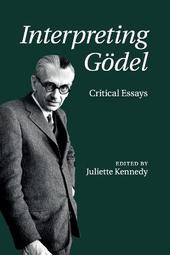
|
Interpreting Goedel: Critical Essays
Paperback / softback
Main Details
| Title |
Interpreting Goedel: Critical Essays
|
| Authors and Contributors |
Edited by Juliette Kennedy
|
| Physical Properties |
| Format:Paperback / softback | | Pages:292 | | Dimensions(mm): Height 230,Width 150 |
|
| Category/Genre | History of mathematics |
|---|
| ISBN/Barcode |
9781316639771
|
| Classifications | Dewey:511.3 |
|---|
| Audience | | Tertiary Education (US: College) | | Professional & Vocational | |
|---|
| Illustrations |
Worked examples or Exercises
|
|
Publishing Details |
| Publisher |
Cambridge University Press
|
| Imprint |
Cambridge University Press
|
| Publication Date |
2 February 2017 |
| Publication Country |
United Kingdom
|
Description
The logician Kurt Goedel (1906-1978) published a paper in 1931 formulating what have come to be known as his 'incompleteness theorems', which prove, among other things, that within any formal system with resources sufficient to code arithmetic, questions exist which are neither provable nor disprovable on the basis of the axioms which define the system. These are among the most celebrated results in logic today. In this volume, leading philosophers and mathematicians assess important aspects of Goedel's work on the foundations and philosophy of mathematics. Their essays explore almost every aspect of Godel's intellectual legacy including his concepts of intuition and analyticity, the Completeness Theorem, the set-theoretic multiverse, and the state of mathematical logic today. This groundbreaking volume will be invaluable to students, historians, logicians and philosophers of mathematics who wish to understand the current thinking on these issues.
Author Biography
Juliette Kennedy is an Associate Professor in the Department of Mathematics and Statistics at the University of Helsinki.
Reviews'These essays explore most aspects of Goedel's legacy, including his conceptions of intuition and analyticity, the Completeness theorem, the set-theoretic multiverse and the current state of mathematical logic.' Graham Hoare, The Mathematical Gazette 'In sum, this is a collection of stimulating essays, mathematically as well as philosophically. They are not exactly easy reading and require familiarity, at least in broad strokes, with Goedel's mathematical work and his central philosophical ideas (as well as their evolution and historical context). The patient reader will be rewarded by a deeper understanding of both.' Wilfried Sieg, Isis
|